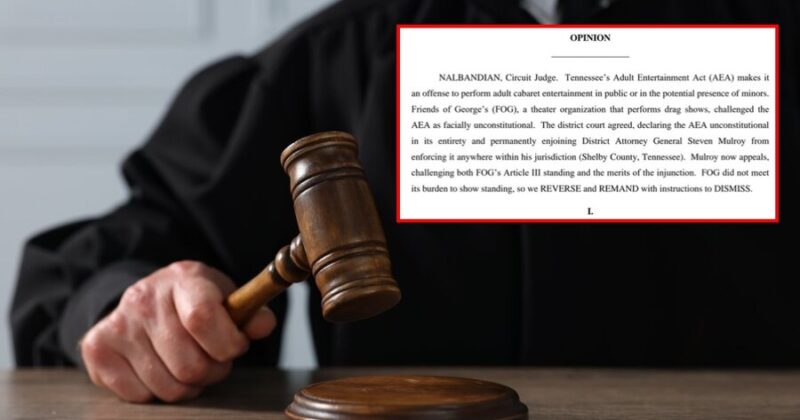On July 18, a federal appeals court overturned a lower court’s decision and upheld a Tennessee law that prohibits performances with strippers or men dressed as women in places where children might see them.
A majority of judges on the U.S. Court of Appeals for the Sixth Circuit ruled that a nonprofit theater group did not demonstrate sufficient standing to challenge the constitutionality of the Adult Entertainment Act (AEA).
The group, Friends of George’s, sued Tennessee officials over the law, alleging it violated rights conferred by the U.S. Constitution’s First Amendment.
In 2023, U.S. District Judge Thomas Parker declared the law unconstitutional, citing that it is overly vague and broad.
The appeals court panel reversed that ruling, finding that Friends of George’s has not provided evidence that it intended to violate the law.
That means the group lacks standing, the judges said.
According to the ruling, even if the organization claimed it planned to violate the law, it would still need to demonstrate that a constitutional interest would be impacted.
“But the law in this area is clear—there is no constitutional interest in exhibiting indecent material to minors,” U.S. Circuit Judge John Nalbandian wrote for the majority.
He pointed to a previous ruling from the appeals court that found certain speech, “while fully protected when directed to adults, may be restricted when directed towards minors.”
“The only constitutionally protected expressions implicated by the AEA are adult-oriented performances that can be constitutionally restricted from minors but not from adults—a narrow slice of speech,” Judge Nalbandian said.
“And the statute doesn’t even ban these performances, merely restricting them to adult-only zones.”
U.S. Circuit Judge Eugene Siler Jr. joined Judge Nalbandian in the ruling.
In a dissenting opinion, U.S. Circuit Judge Andre Mathis argued that Friends of George’s has standing to challenge the law because the organization is likely to host shows impacted by it, exposing them to potential prosecution.
He also noted that the group’s shows, which have no age restrictions, seem to be protected by the First Amendment.
The majority and dissenting opinions also differed on specific aspects of the law. The majority argued that the law’s restriction on shows deemed “harmful to minors” applies only to materials lacking serious literary, artistic, political, or scientific value for a reasonable 17-year-old, referencing a 1993 Tennessee Supreme Court ruling.
In contrast, the dissent contended that the law prohibits shows for all minors, pointing out that no court has limited the law as written by state legislators.
Friends of George’s said in a statement it was shocked and disappointed with the decision.
“Instead of addressing the constitutionality of Tennessee’s drag ban, today’s ruling has left us and thousands of others in the LGBTQ+ community dangerously in limbo, with no clear answers as to how this ban will be enforced and by whom,” the group said in a social media post.
Share your thoughts by scrolling down to leave a comment.


Let’s not leave the social and cultural degenerates alone. Let’s violate them.